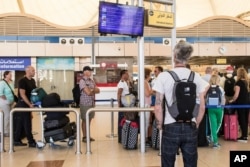British Foreign Secretary Philip Hammond says stepped up security measures have slowed his country’s flights out of Sharm el-Sheik, Egypt, from where thousands of foreigners have been trying to evacuate in the wake of a deadly October 31st air disaster.
However, Hammond said in Washington that about 7,000 British citizens have been repatriated and a “backlog” is expected to be cleared by the end of this week.
Militants claiming affiliation with the Islamic State group have claimed responsibility for the October downing of the Russian airliner. The plane went down in Egypt’s Sinai Peninsula, killing 224 people.
Russian Prime Minister Dimitry Medvedev said the downing may have been due to a terrorist act - marking the first time a top Russian official acknowledged that militants may have caused the disaster. He made his remarks in an interview with the Russian government newspaper Rossiyskaya Gazeta.
But the head of Egypt's investigation team says no conclusions have been reached about what brought the airliner down.
Forensic Determination
Hammond said a definitive answer on whether or not the cause of the plane crash was a bomb would come from a forensic examination of the wreckage.
“That is clearly not under our control,” he said.
Planes from Russia, Britain and Western Europe have been arriving in Egypt to take nationals home, after several countries and airlines suspended new flights to the country.
Thousands of Russian tourists returned from Egypt Monday aboard special planes sent by Russia, which has suspended all commercial fights to Egypt amid security concerns.
Britain's embassy in Cairo has been careful to label the departures not as evacuations but as tourists going home at the end of their trips. Still, the Foreign Office is advising against "all but essential travel by air" to or from the Red Sea destination because of the "significant possibility" that the Russian Metrojet crash was caused by an explosive device.
In Jerusalem Monday, Israeli Defense Minister Moshe Yaalon said there is a "high probability" that militants brought the plane down with an "explosive device." Israel closely monitors the Sinai for militant activity.
An unexplained noise during the final second of audio recordings from the cockpit has drawn intense attention. Egypt's chief investigator, Ayman al-Muqaddam, said his team has not determined whether that signaled an explosion.
Mike Richman and Chris Hannas contributed to this report





